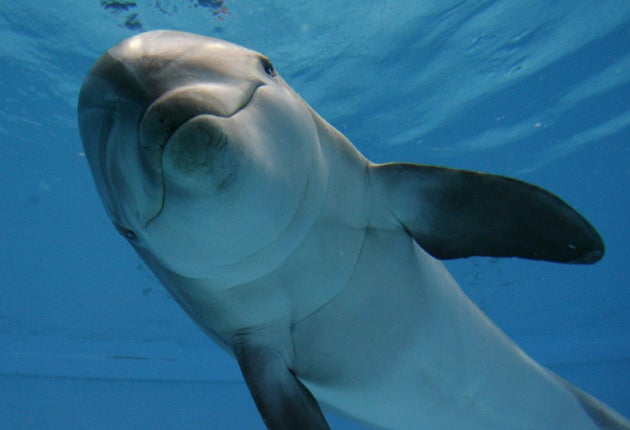Dolphins may hold the key to a cure for type II diabetes

Your support helps us to tell the story
From reproductive rights to climate change to Big Tech, The Independent is on the ground when the story is developing. Whether it's investigating the financials of Elon Musk's pro-Trump PAC or producing our latest documentary, 'The A Word', which shines a light on the American women fighting for reproductive rights, we know how important it is to parse out the facts from the messaging.
At such a critical moment in US history, we need reporters on the ground. Your donation allows us to keep sending journalists to speak to both sides of the story.
The Independent is trusted by Americans across the entire political spectrum. And unlike many other quality news outlets, we choose not to lock Americans out of our reporting and analysis with paywalls. We believe quality journalism should be available to everyone, paid for by those who can afford it.
Your support makes all the difference.They are warm blooded, social and highly intelligent animals, and just like humans their brain is much bigger than expected for their size. But dolphins also share something else with man – they suffer a diabetes-like state not seen in any other wild animal.
Dolphins appear to be unique among mammals in that they are able to suddenly switch off the ability of the insulin hormone to control sugar levels in the bloodstream. This "insulin resistance" is known to be an unhealthy precursor in humans to type II diabetes. Now marine biologists believe the dolphin's ability to turn the insulin-resistance switch on and off may be the key to a cure for the human disease.
Insulin resistance is a growing problem in the human population and is linked with a high-calorie diet and obesity. It results in insulin becoming less effective in converting soluble glucose in the blood into insoluble glycogen, a carbohydrate stored in the liver.
Eventually, insulin resistance in humans causes blood sugar levels to fluctuate widely with the risk of type II diabetes. However, some bottlenose dolphins have use insulin resistance as a way of controlling glucose levels during short periods of fasting at night when they cannot catch fish.
Dolphins feed exclusively on fish, which is high in protein but low in carbohydrates such as starch and sugars. This, combined with the energy demands of their exceptionally large brain, means they have a problem with ensuring constant levels of glucose in their blood. The researchers found that when dolphins fast at night they are able to temporarily immobilise insulin and prevent it lowering glucose in the blood. This ensures that the dolphin has enough glucose at night to keep its large brain continually fed with energy.
"While some people may eat a highprotein diet to help control diabetes, dolphins appear to have developed a diabetes-like state to support a high-protein diet," said Stephanie Venn-Watson, director of clinical research at the US National Marine Mammal Foundation.
"Shared large brains that have high blood glucose demands may explain why two completely different species, humans and dolphins, have developed similar physiological mechanisms to handle sugar. Seals have the same diet as a dolphin but don't have this diabetic, on-or-off state. It may be because of this large brain factor. In terms of brain size compared to body size, humans come first and dolphins are next. We are looking at two species with big brains that have high demands for glucose."
In humans, insulin resistance is a sign of ill health and cannot easily be reversed. However, in dolphins it appears to be a natural state switched on and off at will. "When healthy dolphins fast overnight, they have multiple changes in blood chemistry that match those reported in people with diabetes. When dolphins are fed, they revert to a non-diabetic state, indicating that dolphins may have a genetic fasting switch that can turn diabetes on and off," Dr Venn-Watson said.
Scientists hope to be able to locate this genetic switch in order to see if something similar can be found in humans. Dr Venn-Watson said: "If dolphins have a genetic fasting switch that can turn diabetes on and off, then finding and controlling such a switch in humans could lead to the control of insulin resistance and possibly the cure to type II diabetes."
Join our commenting forum
Join thought-provoking conversations, follow other Independent readers and see their replies
Comments